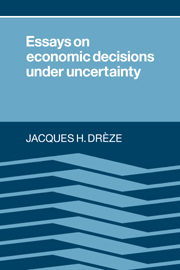Book contents
- Frontmatter
- Contents
- Acknowledgements
- Foreword
- I Decision-making under uncertainty: general theory
- II Markets and prices
- III Consumer decisions
- IV Producer decisions
- 11 Demand fluctuations, capacity utilisation and prices
- 12 Demand fluctuations, capacity utilisation and costs
- 13 On industry equilibrium under uncertainty
- V Theory of the firm
- IV Human capital and labour contracts
- VII Public decisions
- Index
11 - Demand fluctuations, capacity utilisation and prices
Published online by Cambridge University Press: 01 October 2009
- Frontmatter
- Contents
- Acknowledgements
- Foreword
- I Decision-making under uncertainty: general theory
- II Markets and prices
- III Consumer decisions
- IV Producer decisions
- 11 Demand fluctuations, capacity utilisation and prices
- 12 Demand fluctuations, capacity utilisation and costs
- 13 On industry equilibrium under uncertainty
- V Theory of the firm
- IV Human capital and labour contracts
- VII Public decisions
- Index
Summary
Introduction
In this paper, we consider an industry supplying a single commodity, the demand for which is uncertain or shifting in time. We show that several standard propositions in the static theory of the firm no longer apply in that context. Consequently, a widely accepted inference about the nature of competition in such an industry becomes unwarranted under our more realistic assumptions.
Section 2 restates the propositions that are challenged later on. A simplified model is introduced in Section 3. Section 4 is devoted to counterparts, for that model, of the propositions listed in Section 2. Four methodological conclusions are presented in Section 6. The appendix collects some properties of the cost function used in the simplified model.
Some propositions from the static theory
Let us consider an industry operating under the following assumptions:
a. it produces a single commodity;
b. all firms are identical;
c. cost for each firm is a function of quantity alone; the total and variable average cost curves of those firms are U-shaped, continuously differentiable, and independent of the number of firms in the industry;
d. there is no restriction to entry, and the number of firms is not required to be an integer;
e. the quantity demanded at each price is fixed for the industry, independently of the number of firms; the demand function is continuous.
- Type
- Chapter
- Information
- Essays on Economic Decisions under Uncertainty , pp. 223 - 233Publisher: Cambridge University PressPrint publication year: 1987
- 1
- Cited by

